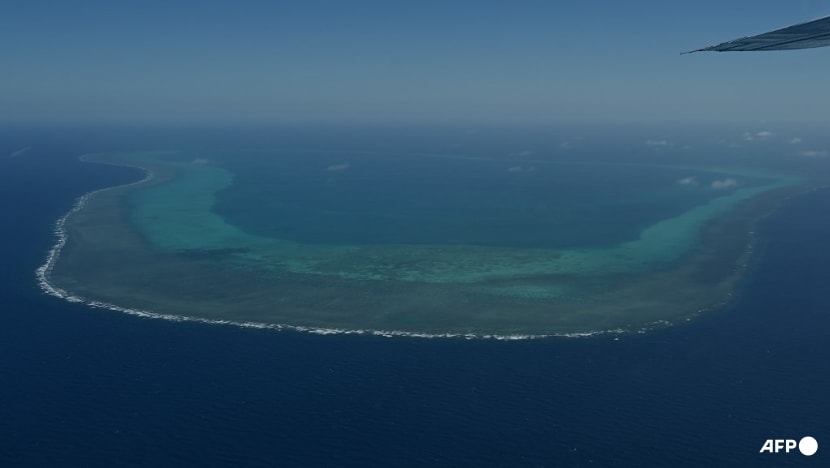Singapore rejects attempts by foreign embassies to incite domestic reactions to international issues: MFA
The US embassy in Singapore earlier posted a video criticising China’s actions in the South China Sea, drawing a response from the Chinese mission.

An aerial view of over Scarborough Shoal in the disputed South China Sea on Feb 15, 2024. (File photo: AFP/Jam Sta Rosa)

This audio is generated by an AI tool.
SINGAPORE: The Ministry of Foreign Affairs (MFA) said on Wednesday (May 21) that Singapore rejects attempts by foreign embassies to incite domestic reactions to international issues involving third countries, adding that complex issues are best resolved through appropriate channels for diplomacy to be effective.
The ministry’s comments came a day after the US embassy in Singapore published a video on Facebook criticising China’s position on the South China Sea.
The post drew a response from the Chinese embassy in Singapore on Wednesday, saying that the US embassy "deliberately distorts the ins and outs" of the South China Sea issue.
In its video on Tuesday, the US embassy made use of visual and verbal references to HDB flats and Singapore town councils to illustrate its point.
It likened China’s claim of nearly the entire South China Sea to an inconsiderate neighbour claiming common spaces in HDB corridors and lift landings as their own.
It also drew an analogy between the United Nations International Court of Justice and the local town councils, depicting China as the neighbour who would ignore the town council’s rulings.
“China says it 'owns' nearly the entire South China Sea. International law says otherwise,” said the US embassy in the Facebook post.
“In 2016, the Hague tribunal ruled Beijing’s sweeping claims have no legal basis - yet construction, patrols, and coercion continue. From militarised reefs to “grey zone” tactics, this isn’t just a maritime dispute - it’s a test of international order, stability, and peace.”
China claims most of the South China Sea despite a 2016 ruling by an international arbitral tribunal that found Beijing's claims have no basis under international law. China does not recognise the decision.
On Wednesday, the Chinese embassy in Singapore said that the US embassy “deliberately distorts the ins and outs of the South China Sea issue”.
“By putting its own priorities over international rules, habitually withdrawing from international conventions and organisations, bullying and coercing other countries on issues like tariffs, and publicly declaring seizing the control of the Panama Canal and Greenland, the US wants to reimpose the law of the jungle where might makes right upon the rest of the world,” the Chinese embassy said in a Facebook post.
“What the US has done is a body blow to the existing international order and rules, and that is why it is universally recognised that the US is the least qualified to even talk about international law.”
The post went on to say that the US somehow believes that, as a country that refuses to join the United Nations Convention on the Law of the Sea, it has the privilege of "microscoping other countries’ compliance with the Convention".
It also added that the US has even deployed intermediate-range missile system in the region to stoke division and confrontation, which the Chinese embassy called "the most destructive force to peace in the South China Sea".
“We urge the US to stop being a hypocritical preacher and provocateur, and refrain from stirring up more troubles for peace and stability in the region,” the Chinese embassy added.
On Thursday, the US embassy in Singapore acknowledged that the video had drawn on the local context as an analogy.
"The United States Embassy in Singapore presents United States government policy and views on issues that affect the safety, security, and prosperity of the United States and the entire region," it told CNA.
The "long-standing maritime disputes in the South China Sea" are one set of such issues, said the US embassy.
"The video explains the US understanding of the dispute by referencing a phenomenon to which anyone around the world can relate," it added, stating "bad neighbourly behaviour running afoul of relevant law" as an example.
"In this case, despite an arbitral court’s ruling that the 'nine-dash line' is inconsistent with relevant international law, some countries continue to assert sweeping claims and engage in aggressive, unlawful, and unilateral behaviour," the statement read.
It went on to say: "Like many of our partners around the world, we support the peaceful resolution of disputes among claimants in accordance with universally recognised principles of international law, including UNCLOS, without resorting to the threat or use of force."



















